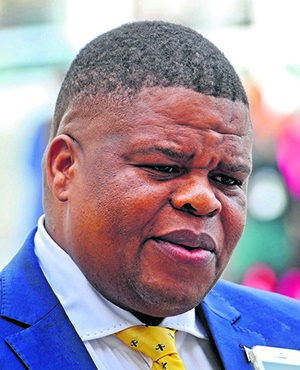
Energy Minister David Mahlobo has punted smaller generation units built in a modular manner, despite the bid by himself and President Jacob Zuma to launch a massive nuclear new build programme.
Mahlobo replied to a question in Parliament that intensive energy users are building their own generation plants and commercial buildings are moving towards roof-top power generation.
As a result, he explained, “electricity demand from the national grid will become more difficult to estimate.
“This necessitates a more frequent revision of the IRP [Integrated Resource Plan] otherwise we may end up building infrastructure that will not be optimally used, i.e. stranded assets.
“The low cost of smaller generation units makes it easy as we now do not have to build large units, i.e. infrastructure build programmes must be implemented in a modular manner so that it can respond to changes in the market.”
He was responding to Economic Freedom Fighters MP Mzingisi Marshall Dlamini, who asked him why he was “seemingly in a rush to expedite a nuclear energy deal that South Africa cannot afford”.
Mahlobo replied that there “is no nuclear energy deal in South Africa that is being rushed and expedited by myself as the minister of energy.
“The department of energy is currently updating the Integrated Energy Plan and the Integrated Resource Plan.”
This came as Earth Life Africa and the Southern African Faith Communities' Environment Institute planned to approach the Western Cape High Court on Wednesday in a bid to stop Mahlobo from proceeding with the controversial nuclear energy deal. The groups won a crucial court victory over government and Eskom in April, which set aside the nuclear procurement programme.
FULL STORY: Eskom promises not to rush ahead with nuclear
IRP to get Cabinet approval 'soon'
Mahlobo said the department was concluding the revised IRP “for approval of Cabinet soon”.
Mahlobo said that historically long-term electricity infrastructure planning in South Africa was very easy and predictable, driven by population growth and GDP growth.
“There is now a decoupling of GDP growth from (an) increase in electricity demand,” he said.
“The relationship is no longer linear. This is because intensive energy users are now using more energy efficient technologies and the structure of the economy is changing less energy intensive industries.”
His response follows leaked findings from Eskom last week, which it had submitted to the energy department of Energy for the draft IRP process. It reveals that the new nuclear option for South Africa is both unnecessary and costly, according to EE Publishers investigative editor Chris Yelland.
“For the first time, this latest work by Eskom incorporates the cost of transmission infrastructure, by including these costs for all the generation technologies and scenarios modelled,” Yelland explained.
“Eskom concludes that contrary to what is often heard, the total cost of grid integration of renewable energy, coal, gas or nuclear is actually minimal in comparison to the cost of the generation component.”
FULL STORY: Eskom’s latest work on energy policy plan rejects nuclear
Earlier this month, an independent study revealed that Eskom should cut down on its coal power network – including curtailing work at Kusile – and should not embark on any new nuclear, gas or coal building programmes if it wants to save itself from financial ruin.
FULL STORY: To save Eskom from ruin, SA should ditch nuclear plan and cut coal power - study
In the midst of Eskom's governance and financial crisis, President Jacob Zuma has repeatedly said that South Africa was committed to developing new nuclear power stations at a pace and scale the country can afford. Critics, who believed it could cost more than R1 trillion and that would threaten the country's fiscal framework policy, wanted the nuclear policy scrapped altogether.
A system analysis undertaken by the Council for Scientific and Industrial Research Energy Centre found that new coal and nuclear plants were simply no longer competitive against the falling costs of renewables and associated technology, the report by Meridian Economics said.
“This means that South Africa does not need a nuclear, coal or gas power procurement or construction programme,” the study showed.




 Publications
Publications
 Partners
Partners








